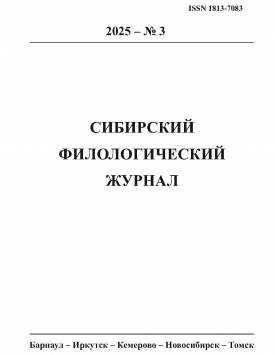Notes from the history of the Russian vocabulary (a case study of the Russian Etymological Dictionary)
This paper demonstrates how the Russian Etymological Dictionary (RES) addresses a key challenge in etymological lexicography: the reconciliation of thorough and representative entries with the demands of brevity and efficient presentation. In pursuit of comprehensive representation, the scope of the dictionary could be expanded to encompass the correlation between Western and Eastern elements within Russian culture and their linguistic reflection. Acknowledging the importance of parsimony and inherent limitations, the author of the RES gives precedence to the principle of maximum representativeness, exemplified by the research on the Old Prussian language conducted by V. N. Toporov. It was recommended that lexical coverage be maximized, foregoing the limitation of vocabulary to literary sources. Following the recommendation, the RES employs both lexical and textual materials extensively. A consequence of this orientation toward completeness is the resultant expansion in the scope and duration of dictionary development. The paper analyzes the aforementioned and related problems in three sections. The focus is on the etymology and semantics of various terms found in Great Russian and Siberian dialects, as well as some literary works. These terms include the watercraft designations kaúk and kayúk, the semimythical bird inog, and the word kazák with its diverse meanings.
Keywords
Russian Etymological Dictionary,
principles of preparation dictionary,
representativeness and limitations,
dialectal vocabular,
literary vocabularAuthors
| Anikin Alexander E. | Institute of Philology of the Siberian Branch of the Russian Academy of Science | alexandr_anikin@mail.ru |
Всего: 1
References
Аникин А. Е. Страничка из истории отечественной этимологии // Русский язык в научном освещении. 2016. № 2 (32). C. 227-249.
Аникин А. Е. О происхождении некоторых русских слов из сферы материальной культуры. I. Водный транспорт: "коч", "бат", "ветка" // Сибирский филологический журнал. 2017. № 3. С. 140-149.
Белова О. В. Славянский бестиарий: Словарь названий и символики. М.: Индрик, 2000. 318 с.
Благова Г. Ф. Исторические взаимоотношения слов казак и казах // Этнонимы. М.: Вост. лит., 1970. C. 143-157.
Богородский Б. Л., Кононов А. Н. Тут ему и каюк пришел: К истории фразеологичеcского словосочетания // Вестник ЛГУ. 1978. № 14. С. 117-127.
Дмитриев Н. К. О тюркских элементах русского словаря // Лексикографический сборник. М.: Наука, 1958. Вып. 3. С. 3-47.
Добродомов И. Г. Веселая этимология. Таракан в этимологическом аспекте // Русская речь. 1970. № 6. С. 96-100.
Журавлев А. Ф. Язык и миф. Лингвистический комментарий к труду А. Н. Афанасьева "Поэтические воззрения славян на природу". М.: Индрик, 2005. 1003 с.
Ларин Б. А. Русско-английский словарь-дневник Ричарда Джемса (1618-1619 гг.). Л.: Изд-во Ленинград. ун-та, 1959. 423 с.
Мызников С. А. Русский диалектный этимологический словарь. Лексика контактных регионов. М.; СПб.: Нестор-История, 2019. 1076 с.
Топоров В. Н. О некоторых теоретических основаниях этимологического анализа // Вопросы языкознания. 1960. № 3. С. 44-59.
Топоров В. Н. Об иранском влиянии в мифологии народов Сибири и Центральной Азии (1-2) // Кавказ и Средняя Азия в древности и средневековье (история и культура). М.: Вост. лит., 1981. С. 146-162.
Топоров В. Н. Из "русско-персидского" дивана. Русская сказка *301А, B и "Повесть о Еруслане Лазаревиче" - "Шах-Намэ" и авестийский "Зам-язат-яшт" (этнокультурная и историческая перспективы) // Этнокультурная и этноязыковая история Восточной Европы. М.: Индрик, 1995. С. 142-200.
Трубачев О. Н. Этимологический словарь славянских языков и Праславянский словарь (опыт параллельного чтения) // Этимология 1976. М.: Наука, 1978. С. 3-17.
Хелимский Е. А. Компаративистика, уралистика. Лекции и статьи. М.: Языки русской культуры, 2000. 639 с.
Хелимский Е. А. Трансъевразийские аспекты русской этимологии // Русский язык в научном освещении. 2002. № 4 (2). С. 75-90.
Liimola M. Etymologische Bemerkungen // Finnisch-ugrische Forschungen. 1971. Bd. 39. S. 258-276.
Vaillant A. La Grammaire comparée des langues slaves. Paris: Klincksieck, 1974. T. 4: la formation des noms. 812 p.

